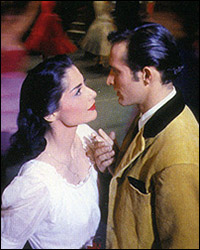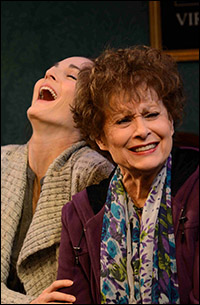
She has gone West again. An amiable, in-season antic by Jason Odell Williams, aptly labeled Handle With Care, has returned her to theatre here after too long an absence.
Of course, one could have hoped for a cheerier comeback than she gets here. Handle with care, she ain't. That's not a spoiler alert—it's a plot peg: She arrives in a small backwoods Virginia burg at Christmastime—technically, D.O.A.—and must get in all of her comic licks in the flashbacks that litter the storyline. Difficult yes, but nothing's impossible for a determined bubala who's not about to let a little thing like death deter her from her self-appointed mission of making her granddaughter's life happier than her own. Strange are the ways of love—and a calculated playwright.
To keep this fanciful little love-farce in the air demands aggressively lightweight acting, and Lawrence, at 81, commendably leads the charge for her youthful cast.
Basically, her plot function comes down to posthumously match-making her Israeli granddaughter, who's mending from a romantic meltdown (Charlotte Cohn), with a recently widowed Virginia rustic (Jonathan Sale), and the contrivance that brings them both together is a dunderhead DHX delivery driver (Sheffield Chastain) who has mislaid Lawrence's corpse on its way to the plane to Israel for immediate burial.
Despite her character's short shelf-life (or maybe because of it), Lawrence musters an engagingly lively portrayal of a peppy granny who has come to rural Virginia from Israel to reclaim a love she'd lost as a teenager. "I love that she's indomitable, that she never gives up," she says of this Edna. "She comes across the ocean to find her childhood beau. She's still in love with him and begs her granddaughter not to make the same mistakes she did. 'Don't let go of love,' is the message, 'keep it alive.'" This comedy tested the waters in Florida, and its reception was such that Douglas Denoff, who co-produced a coupla Tony contenders of late (The 39 Steps and Nice Work If You Can Get It), thought it might find a comparable reaction at the Westside Theatre, which has had the welcome mat out for Jewish-themed entertainments.
"Doug's an old friend," says Lawrence. "He just called and said, 'I'd like to star you in a show I think you'd be right for,' and I asked to see the script. That was all it took."
 |
||
| Carol Lawrence and Larry Kert in West Side Story |
Tight teamwork like that is something she first forged 56 years ago on a fire-escape balcony with Larry Kert as the star-crossed Tony and Maria of West Side Story.
"When you're approaching Jerry Robbins, you had to unite as a team and support each other because he was often brutal," she remembers. "Larry and I went through the war together. We were in the trenches. He's my favorite leading man of all time."
These two young icons reunited in middle age for a "Together Again!" set at Rainbow and Stars in October 1990, and it was a more melancholy event than they meant it to be. "As we were preparing the act," she recalls, "he called me and said, 'I just got the worst news of my life—and you may not want to continue rehearsing: I have AIDS.' I was so grateful that he told me over the phone because I would not have been able to hold back the tears. I said, 'Oh, Larry, we have to do the show now. We really have to.' And we did, and he was, of course, magnificent." Kert died the following summer. "I miss him. I still feel that he's going to walk in that door."
Broadway's first and most famous Maria really IS a Maria. She was born Carol Maria Laraia. "When I was 13, I had a nightclub act, and my father suggested the name change. He said, 'They'll never be able to pronounce your name correctly so go with Lawrence. Everybody can spell it. Everybody can read it and remember it.' He was very smart. Today, people will make an effort with odd names, but not back then." Carol Lawrence made her Broadway debut as one of the New Faces of 1952 (others included Eartha Kitt, Paul Lynde, Alice Ghostley, Robert Clary and, the book writers, Ronny Graham and "Melvin" Brooks). "Everybody did everything in that show—singing, dancing, sketches. It was a great learning experience for me. Leonard Sillman, who ran it, was a real taskmaster—and a Christian Scientist so you were never allowed to be sick. He would always say, 'No—I would go on!'"
In the Broadway career that followed this, Lawrence has sung the crème de la crème of tunesmiths. In addition to Bernstein & Sondheim, there've been Rodgers & Hammerstein (South Pacific), Hague & Horwitt (Plain and Fancy), Harry Warren and Lawrence & Lee (Shangri-La), Jule Styne and Comden & Green (Subways Are for Sleeping), Jones & Schmidt (I Do! I Do!) and Kander & Ebb (Kiss of the Spider Woman). She replaced in the last two, following her West Side Story Anita, Chita Rivera, into the tangled, Tony-winning web of the Spider Woman. She's pretty much queen of the career that continues after these shows close—their cast recordings.
"Did you know the original cast album of West Side Story is number five on the list of most sold records in the history of recording?" she beams proudly. "Number one is 'White Christmas.' I don't know what's two, three and four—just one and five."
Maria is hardly a supporting role in West Side Story, but Lawrence nabbed her only Tony nomination as a Featured Actress and was the only member of the below-the-title newbie cast to get nominated. If it's any consolation, she lost to Barbara Cook whose Marian the librarian in The Music Man was a hardly supporting role as well.
 |
||
| Charlotte Cohn and Carol Lawrence in Handle With Care. |
||
| Photo by Doug Denoff |
Between her first and third divorces, Lawrence fell in love with the boy not next door but across the Broadway street—Robert Goulet, when he was Lancelot in Camelot at the Majestic when she was in Subways at the St. James. "We married shortly after that and were those dolls on the wedding cake for a long time."
Theirs was a Broadway storybook romance and lasted 18 highly photogenic years during which they toured in Camelot (she as Guenevere, he upgraded to Arthur) and did Kiss Me, Kate on TV where they were convincing as warring theatrical marrieds.
Lawrence has done tons of television—including an 18-month stint in the '60s as Italian matriarch Angela Eckert on "General Hospital"—and exactly one feature film: "Vu Du Pont," a 1962 English-speaking French production of A View From the Bridge. She played the part that would win Scarlett Johansson a Tony Award 48 years later—the niece and latent-lust object of a tragically unaware Red Hook longshoreman. "One movie—isn't that a horrible admission!" she sighs. "I only got that because of Sidney Lumet. I had done a couple of TV 'Plays of the Week' he directed—'The Dybbuk' and 'Rashomon.' My favorite performance on television, perhaps, is in 'The Dybbuk,' so when he said, 'You'll now come and do A View From the Bridge,' I went.
"It wasn't by choice that I made just one movie. I think it was timing more than anything else. I went on the road with Bobby. I stayed home and raised our sons. A career has to be such a thrust. You have to truly get on that bandwagon and never step off at the station. You cannot miss that next stop. You have to stay on board." For careers, her two sons went medical instead of musical. Michael Goulet, brags Mom, "is a psych nurse. He determines whether people who have just been arrested are psychiatric or jail-worthy. His brother, Christopher, is studying to also be a nurse.
"Christopher has a four-year-old daughter, Kaelyan, and she knows how to skype. She woke me up this morning. There's really no difference between the Italian grandmother I do in life and the Jewish grandmother I do in the play. Both full of dominance, a kind of hands-on caring, the kind of deliberate 'I will help you be happy'-'I will feed you'-'I will cajole you'-'I will hold you'—it's all exactly the same."
Lawrence hasn't just come back to New York to do a play. She's taken up residence here—and where else, of course, but the Upper West Side? It totally figures, right?









